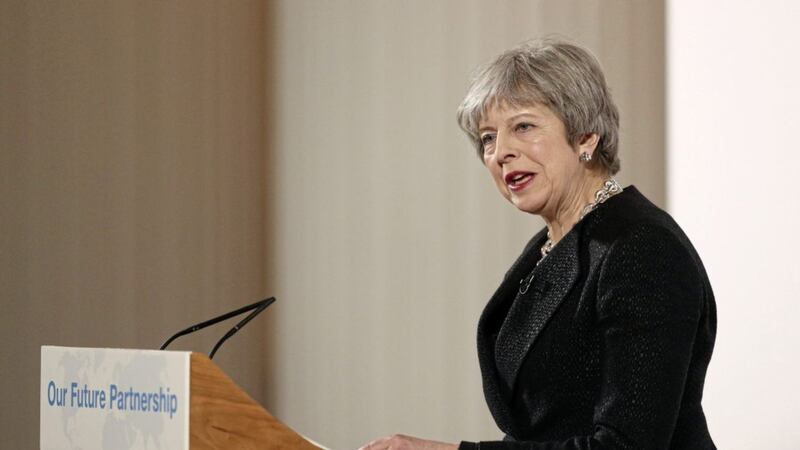THERESA May has said the UK wants a Brexit agreement on customs to achieve as "frictionless a border as possible" in Ireland.
In a high-profile speech in London yesterday, the prime minister said her government has already set out two options – a customs partnership or a "highly streamlined customs arrangement".
The first would see the border remain free-flowing as the UK mirrored EU requirements for imports from the rest of the world, applying the same tariffs and the same rules of origin as Brussels.
"But, importantly, we would put in place a mechanism so that the UK would also be able to apply its own tariffs and trade policy for goods intended for the UK market," she said.
Under option two there would be "a range of measures to minimise frictions to trade, together with specific provisions for Northern Ireland".
Mrs May made clear she regarded European Commission proposals to retain customs union arrangements in Northern Ireland as "unacceptable", but said she accepted Britain's "responsibility" to help find an alternative solution, saying she believed this could be achieved by technological means or through a broader trade agreement.
Elsewhere in her speech, the prime minister issued a call for "pragmatic common sense" to deliver a wider Brexit deal that will be good for Britain and Europe.
In an apparent warning to hardline Brexiteers to temper their expectations, she acknowledged that neither side would get "exactly what we want" in talks on the future UK/EU relationship.
But she also sent a blunt message to Brussels that the EU must face "hard facts" and resolve "tensions" in its own stance if it is to help deliver the best outcome for both sides.
She dismissed the European Commission's insistence that it would not allow "cherry-picking" of rights and obligations, insisting that this was a part of any trade negotiation.
And she rejected chief Brexit negotiator Michel Barnier's argument that her "red lines" on quitting the single market, customs union and European Court of Justice have left only the option of a Canada-style free trade agreement, insisting that Brussels needs to "look beyond the precedents, and find a new balance".
With talks on the future relationship due to start this month and reach broad agreement by October, Mrs May offered reassurance to Brussels that she would not give in to calls from Brexit hardliners to walk away from the table if things did not go her way.
"We will not be buffeted by the demands to talk tough or threaten a walk-out," she said.
"Just as we will not accept the counsels of despair that this simply cannot be done."
But in response to questions, she stood by her mantra that "no deal is better than a bad deal".
Mrs May said that any deal must pass "five tests" of respecting the 2016 referendum result; delivering an enduring solution; protecting security and prosperity; leaving Britain an "open, outward-looking, tolerant, European democracy"; and strengthening the union of the UK.
And she said the agreement should rest on "five foundations", including binding commitments to ensure fair and open competition and an independent arbitration mechanism to resolve disputes.
In a message agreed with her Brexit "war cabinet" at Chequers last week, she said Britain was ready to:
- Accept "binding" reciprocal commitments to ensure fair and open competition for businesses and rule out any "race to the bottom" on standards;
- Give up passporting arrangements in return for a new system allowing financial services in the UK and EU to access each others' markets by maintaining "the same regulatory outcomes over time";
- Allow UK courts to "look at" ECJ judgments, particularly where Britain and the EU have identical laws;
- Make "appropriate" financial contributions for associate membership of Europe-wide medicines, chemical and aerospace agencies;
- Develop a "labour mobility framework" to allow businesses and self-employed professionals to work across the UK and EU;
- Establish "mutual recognition" in areas like regulation of goods, broadcasting licences and professional qualifications.








